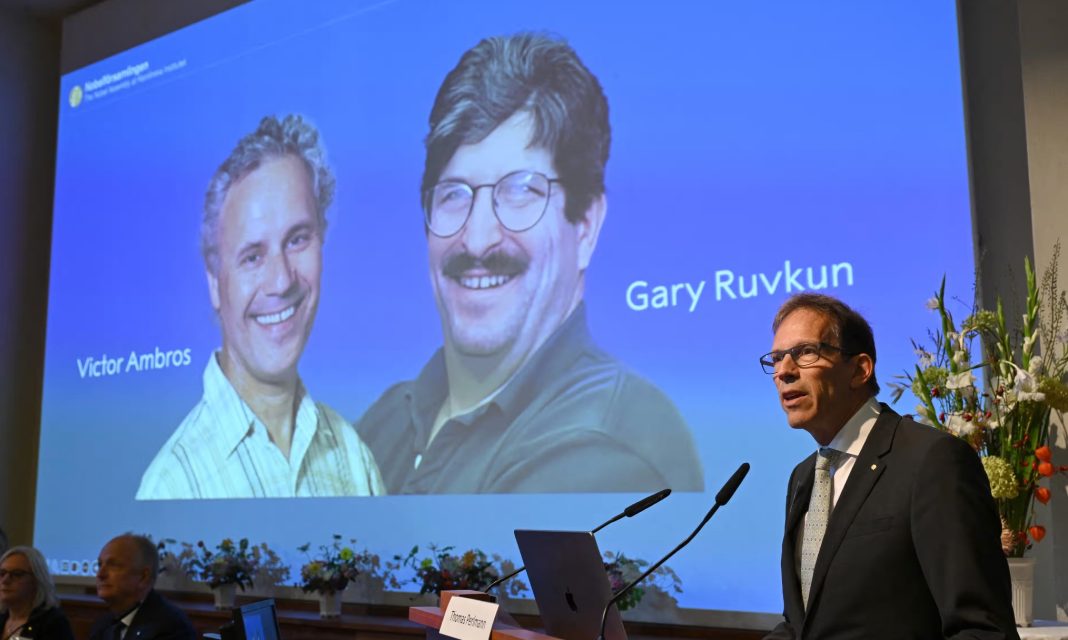STOCKHOLM, Sweden — Victor Ambros of the University of Massachusetts Medical School and Gary Ruvkun of Harvard Medical School and Massachusetts General Hospital have been awarded the Nobel Prize in Medicine for 2024 for their groundbreaking discoveries of microRNA and its role in gene regulation.
The Nobel Assembly announced the award at the Karolinska Institute on Monday, October 7, 2024. The two scientists will share the prize of 11 million Swedish kronor (approximately £810,000).
Their work has significantly expanded our understanding of how cells regulate the production of proteins, despite carrying identical DNA.
“The seminal discovery of microRNA has introduced a new and unexpected mechanism of gene regulation,” said Olle Kämpe, vice-chair of the Nobel Committee for Physiology or Medicine.
“MicroRNAs are important for our understanding of embryological development, normal cell physiology, and diseases such as cancer.”
Ambros and Ruvkun’s work, which began in the early 1990s, focused on tiny stretches of RNA that help cells control the production of proteins.
Their findings answered a longstanding question in molecular biology: how cells with identical DNA, such as nerve and muscle cells, produce highly specialized proteins at the right time and place.
“The question is: what determines that only the right genes are transcribed into mRNA and then translated into the correct tissue-specific proteins at the right time?” Kämpe said.
Previously, scientists believed that proteins known as transcription factors, which bind to DNA and regulate the production of messenger RNA (mRNA), were the primary players in this process.
However, Ambros and Ruvkun’s research showed that microRNA could directly bind to mRNA, preventing the instructions for protein production from being carried out.
Working with the tiny roundworm C. elegans, the two scientists independently published their landmark research in the early 1990s, demonstrating how microRNA can control gene expression by blocking mRNA from reaching the protein-making machinery within the cell.
“For a long time, however, microRNA was believed to be an oddity, peculiar to C. elegans,” said Kämpe.
But over time, researchers identified more than a thousand different microRNAs in humans, which regulate various biological processes, from development to disease.
Their discovery also led to further revelations: microRNAs not only block mRNA from making proteins but can also cause mRNA to degrade.
“Every microRNA regulates several mRNAs, and each mRNA is often regulated by many distinct microRNAs, creating a robust system for gene regulation,” Kämpe added.
The significance of Ambros and Ruvkun’s work has reverberated through the scientific community.
Professor Venki Ramakrishnan, who shared the Nobel Prize in Chemistry in 2009, described their award as “a very well deserved and long-awaited prize.”
Ramakrishnan noted that the discovery “opened up an entirely new field of biology and has broad implications.”
Despite the celebration, there were mentions of those who were not included in the prize. Ramakrishnan pointed out that David Baulcombe, who shared the 2008 Lasker Award with Ambros and Ruvkun for similar work in plants, was notably absent from this year’s Nobel honors.
Thomas Perlmann, Secretary General of the Nobel Assembly, recounted how he informed Ruvkun of the prize early Monday morning.
“His wife answered, and it took a long time before he came to the phone and sounded very tired,” Perlmann said.
“But he quite rapidly was quite excited and happy when he understood what it was all about.”
At the time of the announcement, Perlmann had not yet been able to reach Ambros. “I left a message on his mobile phone and hope he gives me a call soon,” he added.
The 2024 Nobel Prize announcements continue this week, with the Physics prize to be revealed on Tuesday, followed by Chemistry on Wednesday.







